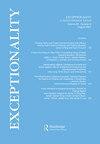Staying on Task: Use of Self-Monitoring and Peer Coaching to Support Inclusive Postsecondary Education
IF 0.9
4区 教育学
Q4 EDUCATION, SPECIAL
引用次数: 0
Abstract
ABSTRACTAlthough applications (apps) for technology-based self-monitoring have received little attention in the literature for college-level students with intellectual disability (ID) in inclusive postsecondary education (IPSE) programs at institutions of higher education, novel tools regularly arrive and are applied within current support structures. I-Connect, a smartphone or web-based self-monitoring tool, has the potential to be an important instrument for promoting independence and access to inclusive academic and workplace environments. The current study used a multi-treatment A-B-A-B-C withdrawal single-case design to determine the effects of peer coaching and a smartphone-based self-monitoring app on the on-task behavior of a college student with autism and intellectual disability. Measurement included the impact of the I-Connect app and peer tutoring in combination with the app and the social validity of the intervention. Findings demonstrated a functional relation for the use of I-Connect with some limitations. The data showed promise for the addition of peer support and were confirmed by a social validity measure. The combination of technology-based self-monitoring supports with the peer supports typically available in inclusive postsecondary education (IPSE) programs can potentially increase key self-determination outcomes. The authors discuss further implications and suggestions for confirming these findings in subsequent inquiries. AcknowledgmentsWe wish to thank the students and staff of the inclusive postsecondary education program that participated in this study. Without their support and willingness, this research would not have been possible. This research study was approved by the Institutional Review Board of Georgia Southern University, approval number H21126.Disclosure statementThere are no financial or non-financial competing interests to report for this study. The researchers have no connection to the I-Connect software used in this study other than it is free software.Data availability statementThe authors confirm that the data supporting the findings of this study are available within the article.Additional informationFundingThis work was not supported under any grants.坚持任务:使用自我监督和同伴指导来支持包容性高等教育
尽管基于技术的自我监控应用程序(app)在高等教育机构的包容性高等教育(IPSE)项目中对智力残疾(ID)的大学生水平的关注很少,但新工具经常出现并应用于当前的支持结构中。I-Connect是一种智能手机或基于网络的自我监测工具,有可能成为促进独立和获得包容性学术和工作环境的重要工具。目前的研究采用多治疗a -b - a -b -c戒断单例设计,以确定同伴指导和基于智能手机的自我监控应用程序对患有自闭症和智力残疾的大学生的任务行为的影响。测量包括I-Connect应用程序和同伴辅导结合应用程序的影响和干预的社会效度。研究结果表明,使用I-Connect具有一定的功能关系和局限性。这些数据显示了同伴支持的增加,并通过社会效度测量得到了证实。基于技术的自我监控支持与包容性高等教育(IPSE)项目中典型的同伴支持相结合,可能会增加关键的自我决定结果。作者讨论了进一步的影响和建议,以确认这些发现在随后的调查。我们要感谢参与这项研究的包容性高等教育项目的学生和工作人员。没有他们的支持和意愿,这项研究是不可能的。本研究经佐治亚南方大学机构审查委员会批准,批准号H21126。本研究没有财务或非财务上的竞争利益报告。研究人员与这项研究中使用的I-Connect软件没有任何关系,只是它是免费软件。数据可用性声明作者确认在文章中可以获得支持本研究结果的数据。本研究没有得到任何资助。
本文章由计算机程序翻译,如有差异,请以英文原文为准。
求助全文
约1分钟内获得全文
求助全文

 求助内容:
求助内容: 应助结果提醒方式:
应助结果提醒方式:


